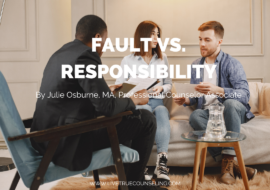Coping with Job Loss
Why is job loss stressful?
I’ve often heard the phrase “It’s just a job” thrown around, and while that may be true in some ways, a job can represent so much to us. It’s the way we pay our bills, provide for our families, have social interactions, and often forms much of our identity. Because of these things, losing a job can be extremely stressful. In the age of COVID-19, people are losing their jobs much more frequently, and often it is entirely unexpected, but there are some things you can do to help with the psychological coping with job loss.
What to do first:
- Recognize that this is a loss, and as such grief will likely accompany it.
Grief looks different for everyone, but this may come in the form of anger, anxiety, illness, etc. It is important to give yourself permission to experience whatever it is that comes with the loss for you. When we experience these difficult emotions, it can be tempting to ignore them, but this is just like sweeping dirt under a rug, it’s always there until you face it.
- Reach out for support
Let your close people know what has happened. Sometimes there is a lot of shame that will come with losing a job, but your close people are not going to judge you for this, in fact, they often just want to be there for you. They may need some guidance on how to help you, but keep in mind they do care. It can help to be direct in asking for what you need, for example: “I really just need to vent about my feelings, would you be open to listening to me without offering advice?”
- Take care of yourself
You may need to just veg out and be sad while binging Netflix, and that is ok, but try to maintain some self-care. Keep up with the big three: Sleep, Eat, Move. For more ideas read my previous blog about life in the time of COVID-19.
Sleep – Do your best to maintain a regular sleep schedule and get at least 8 hours of sleep
Eat – Eat healthy foods, and make sure you are maintaining as best of diet as you can to help your body and brain function well
Move – It’s probably not the best time to train for a marathon (more power to you if that is what you want to do) but try to get up and move each day. A walk around the block can do wonders for your mental and physical health.
What to do next:
- Check out Unemployment Benefits
One of the most difficult things in coping with job loss is finances, but unemployment can help. These can be different in each state, but every state will have something, check out this site for information by the state as well as updates from COVID-19.
- Get your healthcare sorted
Your health is a priority no matter what your job status, here in Oregon, you can apply for the Oregon Health Plan, and often get coverage immediately
- Seek out therapy
Therapy can be helpful for a variety of issues, both for the psychological aspects of losing a job, as well as the technical career aspects. Live True Counseling is offering 6 weeks of “pay what you can” sessions to those that have lost jobs in the fallout of COVID-19.
Coping with Job Loss can feel impossible, but we are here to help. If you are ready to start looking for a new job, check out Jenny’s blog here about how to find a job during a pandemic.
Emily Thomas loves seeing clients as a therapist at Live True Counseling; believing every day she gets to explore someone’s life with them is a privilege. When not in the office, she can be found snuggled up on the couch of her tiny house with her pets, tending her garden or reading a good book in a coffee shop. On sunny days she loves to take in all the natural shades of her favorite color green, exploring beautiful Oregon.










Write a Comment